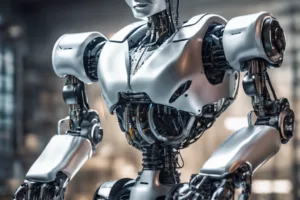
Engineers Utilize AI to Create More Cost-Effective, Environmentally Friendly Infrastructure
Amid the growing concern over the deteriorating state of American infrastructure and the environmental implications of construction, a new solution is being explored in Pennsylvania. Here, engineers are leveraging the power of artificial intelligence (AI) to create lighter concrete blocks and noise-absorbing highway walls. These innovations aim to not only save on costs but also to mitigate the environmental impact of construction.
The Struggle of Infrastructure Repair
The United States needs help to repair or replace its aging infrastructure. With federal funds only covering a fraction of the necessary costs, engineers are turning to AI as a potential solution. The goal is to create resilient, cost-effective, and environmentally friendly structures that can withstand the test of time.
The Role of AI in Infrastructure
AI is being used to develop innovative solutions to these pressing issues. One such project involves the creation of lightweight concrete blocks using AI technology. Another employs AI to design highway walls capable of absorbing noise pollution and greenhouse gas emissions from traffic. These initiatives are being developed by a consortium that includes the University of Pittsburgh and the Pennsylvania Department of Transportation.
The Environmental Impact
The environmental implications of these AI-driven projects are significant. Cement production accounts for at least 8% of the world's carbon emissions, and 30 billion tons of concrete are used globally yearly. More efficient production of concrete, facilitated by AI, could profoundly impact reducing these emissions.
The Economic Implications
Beyond the environmental benefits, AI also promises economic advantages. By optimizing the use of materials and reducing waste, AI can significantly lower the cost of infrastructure projects. This cost-effectiveness could address the nation's infrastructure needs without breaking the bank.
The Future of Construction
As AI continues to evolve, its potential applications in construction and infrastructure development are limitless. From designing more efficient buildings to creating more intelligent transportation systems, AI could revolutionize how we build and maintain our cities.
The use of AI in infrastructure development represents a promising intersection of technology, economics, and environmental stewardship. As engineers continue to harness the power of AI, we may see a future where infrastructure is more resilient, cost-effective, and environmentally friendly. This innovative approach could be the key to addressing the pressing infrastructure needs of the nation while mitigating the environmental impact of construction.

George Smith, with over a decade in tech journalism, excels in breaking down emerging tech trends. His work, spanning tech blogs and print, combines in-depth analysis with clarity, appealing to a wide readership. George's pieces often explore technology's societal impact, showcasing his foresight in industry trends.







